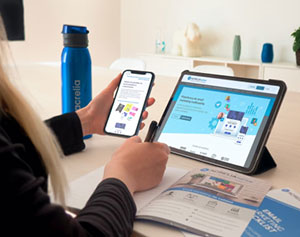5 Rules of B2B Engagement During Challenging Times

Blog post By Paula Chiocchi on 2020-04-15
While the temptation for many businesses may be to suspend marketing operations during the current crisis, a better way forward is to continue – yet alter – your campaigns. In fact, with more people working from home than ever, some studies are reporting an upsurge in email volumes and increased open rates, as recipients are traveling less and able to pay more attention to their inboxes. The truth is, your target audiences still may want to hear from you. But the way you communicate with them should be adjusted.
Building upon the hands-on email tips we shared previously, here are five rules of B2B engagement that set the right tone and demonstrate leadership during challenging times:
- Show empathy: Some industries have been hit harder than others by the pandemic – travel and hospitality, for example. But regardless of your customers’ or prospects’ market segment, this is not the time for salesy promotions or extreme campaigns. Instead, I recommend a somewhat subdued approach: show empathy, respect and support, because we truly do not know what our target audiences may be going through. That’s why it’s important that your campaigns somehow reflect that these are difficult times – be sincere, honest and transparent.
- Proactively connect with your customers with compassion: Your customers may be wondering how your business is doing, and what, if anything, has changed, or if there is anything they need to be doing differently as they work with you. They may even be concerned about you, personally. And, you may have new policies in place that impact them. For all these reasons, email communications and social posts providing your status and instructions for any changes would likely be welcomed. You should also proactively check in with customers by phone, text or otherwise to see how they are and how their families are faring. Ask if their business needs have changed and whether there is anything you can do to improve their current operations or situations relative to your solutions, services or support. Expressing your concern is a sign you care, and let’s face it, we could all use a little more compassion these days.
- Illustrate how your solutions make a difference during difficult times: With so many people working remotely, some companies, such as Amazon and Zoom, are actually seeing increased demand for their products or services. At OMI we are also seeing an uptick as our clients turn to us to ramp up business development by identifying and reaching new prospects. If your solutions fit into this category and can enable businesses to save money, increase efficiencies, support supply chains, drive sales, assist employees, or make a difference at this time, it’s ok to remind prospects of your value and how your offerings can be applied in light of current conditions. But don’t be salesy. Instead, take a helpful, supportive approach. And, if it’s possible, consider how you can pivot your business strategies or even donate your solutions to those organizations or consumers who may need extra support at this difficult time.
- Plan for contingencies: Although estimates as to the duration of the current crisis are varied and fluid, consider the impact to your business customers on a short, medium and long-term basis, as well as best and worse-case scenarios. How will you handle automated order renewals, contract terms, inventory shortfalls, delivery hurdles, planned events, etc.? Again, think in terms of how your company can be flexible to serve the evolving needs of your customers, and get ahead of what their questions may be and address them proactively to calm any concerns.
- Look ahead to the future: At some point this crisis will end. And when it does, there may be a rush of employees returning to work, companies starting up again and re-hiring, business trips booked, meetings and events rescheduled, etc. If everything was “normalized” today, how would your company support customers in getting back to work and operating at peak efficiency again? What special offers, discounts, bundling, or promotions would you offer your clients to get them functioning as quickly as possible? Think about this and plan for your messaging now – things may turn for the better quickly and you want to be out front in the eyes of your customers and prospects.
Last but not least, don’t forget your employees. Forrester Research says investing in improving employees’ well-being will also improve the customer experience (CX) your business delivers. “Take steps to ensure employees are able to take care of themselves in these difficult times — otherwise they won’t be able to take care of your customers,” Forrester advises.
Remember that your customers and employees are human beings. Most of us are concerned, stressed or fearful at this time of crisis. The opportunity is there for you to take initiative, demonstrate leadership, and shine a light for others. My advice is simple: be kind.
Outward Media’s proven data cleansing services and targeted, accurate email data can enable you to achieve better email marketing ROI and, ultimately, convert more prospects into customers. Take a look at our case studies to find out more.
DOWNLOAD YOUR FREE ebook
At OMI, we believe good things happen when you share your knowledge. That's why we're proud to educate marketers at every level - in every size and type of organization - about the basics of email marketing and the contact data that powers it.
-
The Executive's 15-Minute Guide to Building a Successful Email Marketing Database
-
A 15-Minute Guide to Fortune 2,000 Businesses and Executives
-
Five Best Practices for Using Email Marketing to Target SMBs



